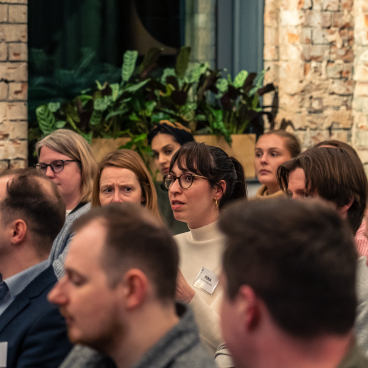Victoria Firth & Rhonda Curliss, co-CEOs of Grey Lemon, on 5 questions to determine if 2024 is your year for change.

When it comes to business, there are certain indicators that often signify it’s time for a change – but the first step is having a leader who is open to seeing them.
According to Victoria Firth & Rhonda Curliss, co-CEOs of business transformation consultancy Grey Lemon, it’s not until business leaders really look for the root cause of the challenges they are facing, that the grey areas holding the business back become clear.
If you’re a business leader reflecting on how your organisation can be ‘more sustainable’, ‘more diverse’, or ‘more attractive to new talent’, it might be time to step back and look at the bigger picture. And if you’re wondering whether the time for change is now, you might want to consider some probing questions, courtesy of Grey Lemon…
The crucial first question to ask yourself is: does your business have clarity of purpose?
“People often come to Grey Lemon with what they think is a problem, but in talking it through, it quickly becomes clear that this problem is actually a symptom of a much larger issue”, begins Victoria. “And therein sits the genesis of the need for change”.
“For us, comments such as ‘we’ve got a lot of attrition – people are leaving us, and we don’t know why’, or ‘we’re pitching for a lot of work, and we’re not winning any of it’ are key indicators that a more systemic, underlying challenge is at play.”
“And when you follow that thread all the way, it always leads back to a core question of purpose”, adds Victoria’s Grey Lemon co-founder Rhonda.
“Some call it ‘vision’, or ‘mission’ – for us, it’s a question of why does this business, exist? What is your purpose? What are you trying to achieve? This isn’t just a marketing tool – it’s the fundamental raison d’être of an organisation.”
Often, Victoria says, businesses just need a fresh pair of eyes. “If it feels like something isn’t working, it typically needs a fresh perspective and a fresh approach.”
"Traditionally businesses can be guilty of shutting their eyes and hoping for the best – ‘we’ve always done it this way and survived, so it’ll be fine’.” But in the current challenging market conditions, the Grey Lemon team is seeing more and more business leaders who are open to trying things a different way.
“We all need to be brave; we need to be bold, and we need to go for it. And that’s why we think 2024 is a good year for change”, comments Victoria.
The second question to ask is: are you ready to face the ‘brutal truth’?
Building on the theme, Rhonda also heralds bravery as being the basis for “getting the real picture of what’s going on.” Something she acknowledges can be scary for business leaders.
Rhonda references Jim Collins, author of Good to Great, and his theory that companies that super-excel out of challenging times are the ones who stop, take complete stock of where they are and acknowledge the ‘brutal truth’ of the situation they are in. From there, if they can then articulate what they are good at, most passionate about, and where they make their money, they start to hone in on where the genuine opportunity lies.
“Once you’ve faced up to where you are now, and become really clear on what your purpose is and what good looks like; you can gain complete clarity on every area of your business. Critically, you can also motivate your team to pull together in the right direction to achieve a common goal.”
Thirdly: does your business have strong leadership in place? These people may not know all the answers – but can they come together to find them?
Sometimes it’s difficult to know where to begin. According to Victoria, it all starts with leadership. “In times of change, strong leadership is what’s needed, and what’s expected. People need structure.”
“People need to know where they stand, and, how they move forward as part of the wider organisation. We all want to know that we are making progress and feel fulfilled both personally and professionally. This is where clear leadership becomes critical”, comments Victoria.
“The truth is that people won’t stay or be attracted to join an organisation in the first place, if there isn’t a clear pathway for progression. It’s endemic. And if there is nowhere to ‘go’, employees will wonder where they’re going to be in 10-years’ time. Therefore, not only is a clearly defined structure essential, but so is complete transparency around the opportunities for elevation”, agrees Rhonda.
The fourth question to consider is: in which areas can your business be both responsible and commercially successful?
Authenticity is a term that’s currently being bandied around in abundance. But what does that actually mean for business?
Speaking on the topic of industry buzzwords, Victoria suggests that the likes of ESG and EDI should be considered as integral as an IT system to an organisation’s culture and operation.
“EDI must be embedded into the very fabric of an organisation. It’s about understanding what it means to you and your business. Every business is an ecosystem, and every ecosystem thrives on fresh air, new perspectives, balance…that’s what comes from creating an inclusive environment where everyone feels supported and equipped to perform at their best.”
”Of course, you can’t answer the question of ‘why is EDI important to us?’ without having clarity of your core purpose”, Rhonda points out. “Everything comes back to that and whether a particular action is moving us towards being more authentic. Is this helping us to achieve the objectives we’ve set out for the next 5, 10, 15 years?”
“You can be a responsible business, and one that’s commercially successful, but you have to put equal eyes on everything in the organisation to find the inefficiencies. This helps weed out, what we call the ‘grey areas’ that are preventing your ecosystem from thriving.”
Finally, ask yourself: is your culture supporting your purpose?
If you’ve used the term, “we’re like a family here”, Victoria and Rhonda believe you may want to rethink. Because in the team’s experience, it’s not what employees want to hear. They’d rather understand expected behaviours, progression, and ultimately, what everyone is working together every day to achieve.
“A lot of the time, we find that an organisation’s culture is badly damaged because people don’t know the organisation’s purpose, or worse, don’t believe in it. Bad behaviour often starts at the top and trickles all the way down because the business has never articulated the core values that everyone is expected to live by and uphold”, comments Rhonda. “If you suspect you have a toxic workplace culture, it’s time to ask yourself, are these people behaving in line with the values and culture we expect - and whose lead is the team following? Now, if you haven’t identified and articulated your values and behaviours, it’s hard to hold anyone to account.”
“We start with some very real discussions with business leaders, with accountability in mind”, adds Victoria. “While we’re there to help define values and behaviours, they need to maintain the process – not just go straight back to the day job. Be consistently clear about what accountability looks like and lead by example to make sure it happens. Because any inconsistencies will affect every other part of the ecosystem.”
Ready to take the first step in making positive change? If so, it’s going to require “a big dose of honesty, self-reflection, hard work, time and investment”, says Victoria.
“Every single business is different”, adds Rhonda, “and it’s about understanding how you can drive change in the most effective and efficient way. That goes for all areas of the organisation and all members of the team. Everyone has a role to play in helping to elevate your organisation and enable it to flourish.“
If you want to hear more from Grey Lemon, listen to Victoria's episode of 42 Roles in the Built Environment here.





